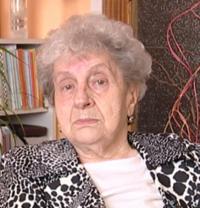“Being imprisoned in Ilava affected all the people there really badly, but I said to myself: ‘I will survive at any cost.’”

Download image
Mária Repáková née Neupauerová was born on March 11, 1931 in Levoča. She had six siblings and as her father was a sexton in the chapel on Mariánska Hora (Marian Hill) in Levoča, they all were raised in accordance with the principles of Christian religion. She gained the primary education in the monastery for women in Levoča. As a fifteen-year old girl she witnessed the murder of a partisan, who was killed by his fellows because of some money in forests near Levoča. It was a fateful moment in her life because after the war those partisans ended up in the regional power structure of the Communist Party of Slovakia. She was falsely accused of being present at so-called rebellion in Levoča. On June 25, 1949, when she was only eighteen years old, and after the fabricated trial, she was sentenced to seven years of imprisonment. Her seventeen-year old brother was sentenced in this trial, too. When she was in custody, she was interrogated very often and as they were tough with her, they forced her to sign a confession. She successively served her sentence in Košice, Ilava and Bratislava prisons. There she met several well-known convicts of the former regime such as Viliam Žingora, Milada Horáková and Anton Tunega. Later, her sentence was changed to five years of imprisonment and five years of forced labour. After being released from prison, she started to work in Hukostav in Košice. She was supposed to serve her five-year long sentence of forced labour there. In the meantime she got married and became pregnant, so she didn’t have to serve the rest of her sentence. However, being released didn’t mean also the end of her affliction, because representatives of the communist regime continued making her life a misery.
